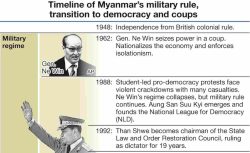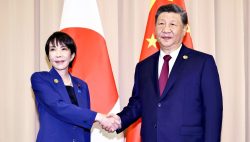Japan-U.S. Summit: Bilateral Cooperation Encompasses Range of Concerns in The World / Strengthen Unity to Create A New Order
15:23 JST, April 12, 2024
The post-Cold War world has never faced such severe challenges as it does today. It is significant that the leaders of Japan and the United States have united and agreed to work together in a wide range of areas, including security, energy and space.
Now is an era for the two countries to further strengthen the Japan-U.S. alliance and utilize it to build a new international order.
Prime Minister Fumio Kishida paid an official visit to the United States as a state guest and met with U.S. President Joe Biden in Washington.
Integrated unit operations needed
During their meeting, the two leaders agreed that the Japan-U.S. alliance “has reached unprecedented heights.” After the meeting, they issued a joint statement that positions the two countries as “global partners” in addressing global challenges not only in the Indo-Pacific region but also around the world.
The most significant feature of this meeting was the decision on a policy of reviewing the respective “command and control” frameworks to enable the Self-Defense Forces and the U.S. military to operate in a more integrated manner.
The U.S. forces in Japan are currently operating under the direction of the Indo-Pacific Command, which has its headquarters in Hawaii.
Meanwhile, Japan plans to establish a Joint Operations Command at the end of this fiscal year to manage the operations of the SDF’s ground, maritime and air branches in an integrated manner. In conjunction with this, the U.S. military reportedly will transfer part of the authority of the Indo-Pacific Command to the U.S. forces command in Japan to proceed smoothly with joint operations with the SDF.
A contingency in the Taiwan Strait is an increasingly realistic possibility. North Korea has repeatedly launched missiles and continued its provocative actions. A system must be put in place so that Japan and the United States can respond immediately in an emergency.
In the meeting, they also agreed to expand joint development and production of equipment, such as missiles. The United States, which has continued to provide military assistance to Ukraine, is facing tight production capacity for equipment. Therefore, the agreement in this regard means that Japan will supplement its production system.
The Kishida administration has decided that Japan will possess counterattack capabilities to strike enemy missile launch sites, and is working to review the conventional roles of the United States as the spear and Japan as the shield.
These efforts will undoubtedly enable the integrated operations of the U.S. military and the SDF and lead to the enhancement of their deterrence capabilities. The agreement reached at this summit may be the starting point for new defense cooperation between the two countries.
However, there are issues regarding integrated operations of the SDF and the U.S. military.
In a situation that threatens Japan’s survival, the SDF can exercise Japan’s right to collective self-defense and cooperate with the U.S. military in fighting. However, if Japan supports the U.S. military in fighting without the recognition of a survival-threatening situation, discussions will be needed on whether being an integral part of combat actions is consistent with the Constitution.
It is vital to sort out problems in line with reality.
Stable supply chains confirmed
The results of the summit are not limited to the defense sector. The two leaders agreed to promote technical cooperation toward generating electricity with nuclear fusion, which is expected to become a next-generation energy source. If put to practical use, it would be able to provide a stable energy source and contribute to the international community.
In the space sector, they decided to send two Japanese astronauts to land on the moon as part of the U.S.-led Artemis program of manned lunar exploration.
On economic security, they confirmed that the Group of Seven advanced nations would cooperate to ensure a stable supply of semiconductors and important minerals, including rare metals.
China has repeatedly used economic coercion to put pressure on countries it has political conflicts with by restricting trade with them in important minerals and other goods. Multilateral cooperation is needed to reduce dependence on China.
The international situation is chaotic, and Japan’s diplomatic abilities are being tested.
The United States is forced to respond to Russia’s aggression against Ukraine and conflicts in the Middle East, and it has only a limited capacity to deal with security issues in Asia.
China increases its hegemonic behavior in the East China Sea and the South China Sea and North Korea also continues its nuclear and missiles development. Japan should play a leading role in protecting peace in Asia.
Make diplomatic efforts for immediate ceasefire
Japan has long supported the development of the so-called Global South emerging and developing countries and has built good relations with these countries. In the Middle East, Japan has never engaged in a conflict and does not get involved in religious hostilities.
It is hoped that Japan will use its strengths and play a role as a bridge between the West and emerging countries. It is important to call on Israel and the Islamist group Hamas for a ceasefire.
In the meeting with Biden, Kishida sought understanding of dialogues and negotiations between Japan and North Korea to resolve the issue of the abduction of Japanese nationals to North Korea, and he obtained Biden’s support.
Even if a Japan-North Korea summit is to be held, it can only be on the understanding that Japan-U.S.-South Korea cooperation is maintained. Kishida must not forget that principle.
(From The Yomiuri Shimbun, April 12, 2024)
Top Articles in Editorial & Columns
-

Myanmar Will Continue Under Military Rule Even After Election, Ex-Ambassador Maruyama Says in Exclusive Interview
-

40 Million Foreign Visitors to Japan: Urgent Measures Should Be Implemented to Tackle Overtourism
-

Expansion of New NISA: Devise Ways to Build up Household Assets
-

China Criticizes Sanae Takaichi, but China Itself Is to Blame for Worsening Relations with Japan
-

Withdrawal from International Organizations: U.S. Makes High-handed Move that Undermines Multilateral Cooperation
JN ACCESS RANKING
-

Univ. in Japan, Tokyo-Based Startup to Develop Satellite for Disaster Prevention Measures, Bears
-

JAL, ANA Cancel Flights During 3-day Holiday Weekend due to Blizzard
-

China Confirmed to Be Operating Drilling Vessel Near Japan-China Median Line
-

China Eyes Rare Earth Foothold in Malaysia to Maintain Dominance, Counter Japan, U.S.
-

Japan Institute to Use Domestic Commercial Optical Lattice Clock to Set Japan Standard Time



















